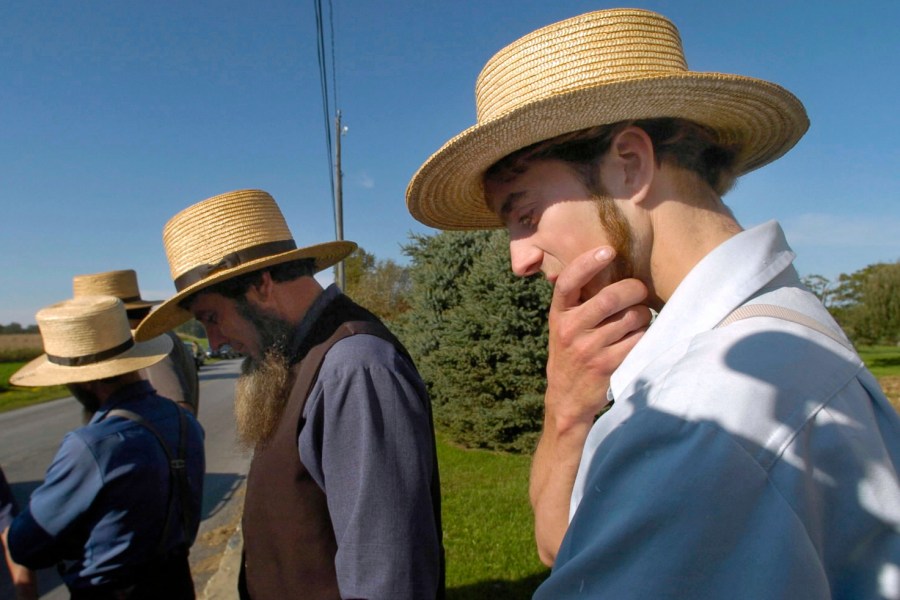Top Stories
Emotional Forgiveness Movements Emerge After Tragic Shootings

UPDATE: In a powerful display of forgiveness, Erika Kirk publicly forgave the gunman who killed her husband, conservative activist Charlie Kirk, during his memorial service last month. Her heartfelt declaration, “That man, that young man — I forgive him,” has sparked a wave of similar sentiments across the nation, highlighting the urgent need for compassion in a divided America.
Just days after this tragic loss, actor Tim Allen revealed that Erika’s words inspired him to forgive the drunken driver responsible for his father’s death 60 years ago. This remarkable moment of healing resonates deeply in a country grappling with trauma, violence, and political polarization.
In Michigan, members of a local congregation are also publicly embracing forgiveness after a recent church shooting that left four dead and eight injured. Their decision to forgive the shooter comes amid an atmosphere of grief and unrest, demonstrating the profound impact of Erika Kirk’s message.
As the nation faces a growing crisis of division, many are questioning whether forgiveness can be a catalyst for change. Miroslav Volf, a theology professor at Yale, emphasized the rarity of such acts in today’s climate. “Erika Kirk’s gesture is the outlier,” he stated, underscoring the contrast between her compassion and the more commonplace anger displayed by others, including political figures.
California pastor Jack Hibbs, a friend of the Kirks, called Erika’s words “an incredibly powerful message of hope.” He stressed that forgiveness is a divine mandate, essential for healing from bitterness and trauma. “Forgiveness sets us free from what has been done to us,” Hibbs affirmed.
The Rev. Thomas Berg, a visiting professor at the University of Notre Dame, expressed hope that Erika’s act would ignite a meaningful national conversation about forgiveness. He noted that true forgiveness is a process requiring time and authenticity, capable of healing even the deepest wounds. “I hope this is not a passing moment,” Berg added, emphasizing the importance of public expressions of forgiveness in bridging societal divides.
In a striking initiative, Dave Butler, a member of The Church of Jesus Christ of Latter-day Saints, launched a crowdfunding campaign for the family of the Michigan shooter, raising over $388,000. Butler’s effort illustrates a broader understanding of compassion, acknowledging the pain experienced by the shooter’s family as well. “They are short a husband and a father,” he explained, calling attention to the shared humanity in tragic circumstances.
The conversation around forgiveness also draws lessons from historical examples, such as the Amish community’s response to the Nickel Mines shooting in 2006, where immediate forgiveness was extended to the perpetrator. This approach offers a counter-narrative to the prevailing sentiments of anger and retribution in today’s society.
However, forgiveness is not universally embraced. Rabbi Jeffrey Myers, who leads the Tree of Life synagogue in Pittsburgh, expressed the complexities surrounding forgiveness following the 2018 attack that claimed 11 lives. “For me, it’s complicated because there are 11 dead people who cannot be sought for forgiveness,” he stated, emphasizing the need for genuine remorse from perpetrators.
As this urgent dialogue unfolds, the question remains: Can acts of forgiveness transform a nation so deeply divided? Many hope that Erika Kirk’s courageous gesture will inspire others to consider the power of forgiveness in healing and reconciliation.
This developing story continues to resonate across America, with many looking for ways to foster compassion in the face of unspeakable tragedy. As communities reflect on these tragic events, the potential for forgiveness may offer a glimmer of hope amid the darkness.
-

 Sports2 weeks ago
Sports2 weeks agoSteve Kerr Supports Jonathan Kuminga After Ejection in Preseason Game
-

 Politics2 weeks ago
Politics2 weeks agoDallin H. Oaks Assumes Leadership of Latter-day Saints Church
-

 Business2 weeks ago
Business2 weeks agoTyler Technologies Set to Reveal Q3 2025 Earnings on October 22
-

 Science2 weeks ago
Science2 weeks agoChicago’s Viral ‘Rat Hole’ Likely Created by Squirrel, Study Reveals
-

 Lifestyle2 weeks ago
Lifestyle2 weeks agoKelsea Ballerini Launches ‘Burn the Baggage’ Candle with Ranger Station
-

 Lifestyle2 weeks ago
Lifestyle2 weeks agoDua Lipa Celebrates Passing GCSE Spanish During World Tour
-

 Entertainment2 weeks ago
Entertainment2 weeks agoZoe Saldana Advocates for James Cameron’s Avatar Documentary
-

 Health2 weeks ago
Health2 weeks agoRichard Feldman Urges Ban on Menthol in Cigarettes and Vapes
-

 Health2 weeks ago
Health2 weeks agoCommunity Unites for Seventh Annual Mental Health Awareness Walk
-

 World2 weeks ago
World2 weeks agoD’Angelo, Iconic R&B Singer, Dies at 51 After Cancer Battle
-

 Business2 weeks ago
Business2 weeks agoMLB Qualifying Offer Jumps to $22.02 Million for 2024
-

 Sports2 weeks ago
Sports2 weeks agoPatriots Dominate Picks as Raiders Fall in Season Opener









